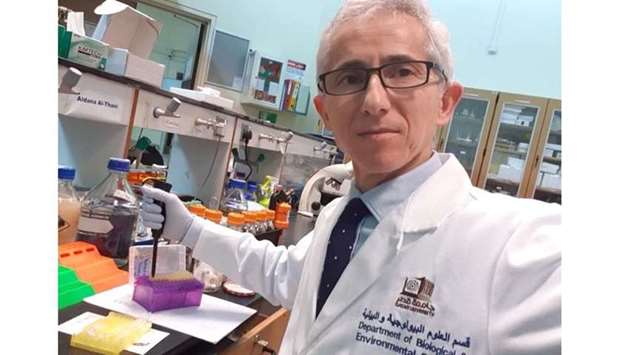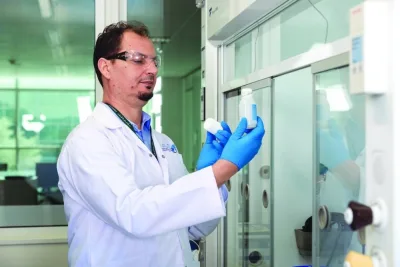Qatar University (QU) researchers, in collaboration with the WHO Collaborating Centre at the University of Montpellier, France, have developed a wide range of biopesticides, produced naturally by non-pathogenic, friendly bacteria isolated from Qatar soil.
Biopesticides are natural molecules acting efficiently and specifically on the targeted pathogens. They are considered to be a safe alternative to chemical pesticides, as they are harmless to humans, the environment and food chains.
Leading the project is Prof Samir Jaoua, professor of Microbiology and Molecular Biotechnology at the Department of Biological and Environmental Science at the College of Arts and Sciences (QU), who says: “The extensive use of chemical pesticides is very harmful to humans, animals and the environment due to the toxicity of these chemical substances. If we continue to use them, they will accumulate in the environment and cause several diseases to humans. In biological agriculture, for example, the use of these pesticides is not allowed.”
Prof Jaoua has been working on the project along with his collaborators Dr Roda al-Thani, Dhabia al-Thani, Fatima al-Yafei, Abeer al-Mohannadi, Dr Zahoor Ul Hassan, Prof Quirico Migheli and QU PhD and MSc students Kavita Nair, Randa Zeidan and Reem al-Asmar. This team, along with a number of other students, set up and produced different types of biopesticides, with the aim of potentially using them in regional bio-industries, “to protect the environment and save human and animal lives, while also efficiently and safely controlling pests and disease vectors,” said Dr Jaoua.
Dr Roda al-Thani said, “This project, which is unique in the Gulf region, is very important as it contributes to the protection of the environment, health and safety. Our team has isolated from Qatar soil and investigated a collection of several hundreds of B thuringiensis strains, which can be considered as an important gene bank of Qatari bacterial resources.”
Prof Jaoua believes that these research results, having been partly published in tens of publications, could be highly impactful. He noted, “We have been isolating and investigating bacterial strains from local Qatar soils and using microbiological and molecular tools to explore them and produce biomolecules of interest. The hundreds of bacterial strains that we have isolated from local soil in Qatar are adapted to this environment and to many similar environments in the world.”
“Qatar soil is a source of microbial gene bank that can be used to produce a huge number of molecules of industrial interests. At QU’s College of Arts and Sciences, Department of Biological and Environmental Sciences, we have isolated a collection of more than 700 bacterial and fungal strains, all very friendly to the environment and producing many molecules of interest. This microbial biobank is a source of molecules that can initiate bioindustries in Qatar,” Prof Jaoua added.
Biopesticides are natural molecules acting efficiently and specifically on the targeted pathogens. They are considered to be a safe alternative to chemical pesticides, as they are harmless to humans, the environment and food chains.
Leading the project is Prof Samir Jaoua, professor of Microbiology and Molecular Biotechnology at the Department of Biological and Environmental Science at the College of Arts and Sciences (QU), who says: “The extensive use of chemical pesticides is very harmful to humans, animals and the environment due to the toxicity of these chemical substances. If we continue to use them, they will accumulate in the environment and cause several diseases to humans. In biological agriculture, for example, the use of these pesticides is not allowed.”
Prof Jaoua has been working on the project along with his collaborators Dr Roda al-Thani, Dhabia al-Thani, Fatima al-Yafei, Abeer al-Mohannadi, Dr Zahoor Ul Hassan, Prof Quirico Migheli and QU PhD and MSc students Kavita Nair, Randa Zeidan and Reem al-Asmar. This team, along with a number of other students, set up and produced different types of biopesticides, with the aim of potentially using them in regional bio-industries, “to protect the environment and save human and animal lives, while also efficiently and safely controlling pests and disease vectors,” said Dr Jaoua.
Dr Roda al-Thani said, “This project, which is unique in the Gulf region, is very important as it contributes to the protection of the environment, health and safety. Our team has isolated from Qatar soil and investigated a collection of several hundreds of B thuringiensis strains, which can be considered as an important gene bank of Qatari bacterial resources.”
Prof Jaoua believes that these research results, having been partly published in tens of publications, could be highly impactful. He noted, “We have been isolating and investigating bacterial strains from local Qatar soils and using microbiological and molecular tools to explore them and produce biomolecules of interest. The hundreds of bacterial strains that we have isolated from local soil in Qatar are adapted to this environment and to many similar environments in the world.”
“Qatar soil is a source of microbial gene bank that can be used to produce a huge number of molecules of industrial interests. At QU’s College of Arts and Sciences, Department of Biological and Environmental Sciences, we have isolated a collection of more than 700 bacterial and fungal strains, all very friendly to the environment and producing many molecules of interest. This microbial biobank is a source of molecules that can initiate bioindustries in Qatar,” Prof Jaoua added.



